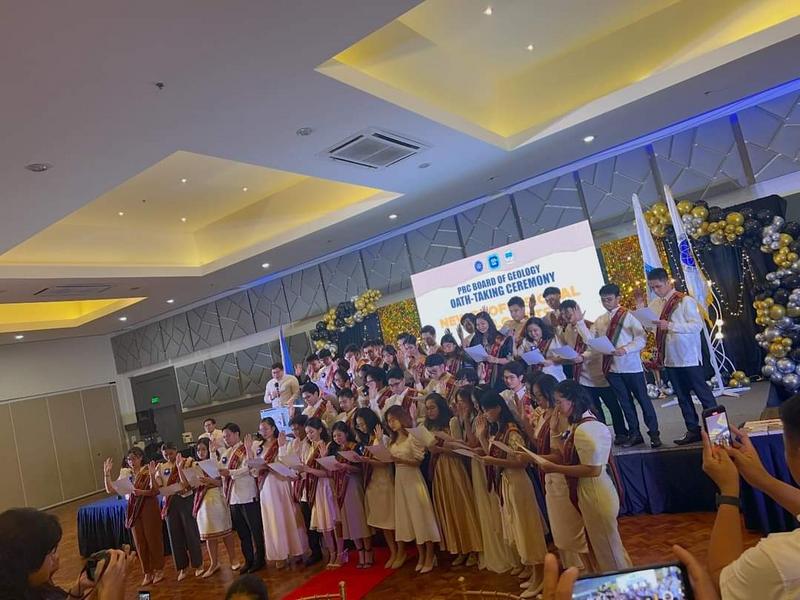As Chairperson of the Professional Regulatory Board of Geology, December of last year was quite a busy month. I was given the honor to present the keynote speech during the opening of the Geological Convention (GeoCon) 2023 last 05 December 2023 and the Oath Taking Ceremonies for New Geologists on 11 December 2023. In my speeches, I emphasized the important relationship between geology and national development as geoscientific data and knowledge are essential for informed decision-making and policy-setting in various areas of the economy. The profession is important in the primary production of mineral and energy resources, infrastructure building, advancement of science and technology, and prediction and cost-damage avoidance through better understanding and mitigation of natural hazards.
During GeoCon 2023, I started my speech with a reflection on the recent onslaught of different calamities and super typhoons that ravaged our country in the last few years. These devastating disasters have had far-reaching impacts, hindering the development and growth of our nation. These highlighted the urgent need to address climate change, not just on a local scale, but as a global concern that affects every aspect of our society.
While the Philippines is a minor contributor to global greenhouse gas emissions, we are undeniably one of the most impacted nations, facing the imminent threat of rising sea levels due to increasing global temperature. Hence, we must recognize that climate change is not an isolated issue. It is an integral factor in our national policy. It is our collective responsibility to tackle this challenge head-on and without hesitation.
To address these challenges, the geology profession must embark on a journey of energy transition, building the capacity for resilient communities and a resilient nation. It is imperative that we develop our green economy, as it holds the key to unlocking numerous job opportunities, livelihoods, and the sustainable future we envision for our people. However, this transition will require a collaborative effort between the government and the various industries that strive to achieve the same goal, and thus, we must work hand in hand to achieve this ambitious goal.
Renewable energy technologies, such as wind turbines, solar photovoltaic panels and batteries, are essential for transition to climate neutrality. Deployment, maintenance and replacement of this infrastructure requires significant resources, including many substances in the list of critical raw materials.
Addressing Wastes
However, waste arising from end-of-life clean energy infrastructure is projected to grow up to 30-fold over the next 10 years. This presents significant opportunities to reduce consumption of scarce raw materials by recycling metals and other valuable resources back into the production systems. Waste arising from the development and use of renewable energy infrastructure includes rare earth elements as well as other valuable materials such as steel, copper and glass.
The fast pace of technological development means that equipment can be subject to relatively rapid obsolescence and can generate complex waste streams. These present technical and logistical challenges for managing this infrastructure at the end-of-life stage. Recovering materials and reintroducing them into the production cycle faces challenges. Policy makers and industry can address the waste and resource challenges associated with the shift to renewable energy technologies through circular economy approaches.
Critical Minerals
The Philippines has grand ambitions to take on the global electric vehicle boom with its nine million hectares of land with high mineral potential. Government estimates suggest less than five percent (5%) of our country's mineral reserves have been extracted so far.

The country is already, after Indonesia, the world's second-largest producer of nickel and the fourth-biggest producer of cobalt. Nickel and cobalt are among the critical minerals crucial to the modern technological world and the clean energy transition. Both are essential elements for electric vehicles batteries, consumer electronics and advanced defense technologies.
However, the Philippines also faces competition from other nations in seeking new investments in critical mineral exploration, development, and processing. At the same time, mining regulatory policies are complicated as the industry has long been synonymous with environmental destruction and social dislocation.
The End of Fossil Fuels?
Developments in clean energy transition have led to an assumption that the world economy is “done” with fossil fuels. There is no need for further development of new non-renewable energy resources, and we have to stop using them as soon as possible. This assumption has also led to a perception of “good” renewables-based technologies, on the one hand, and “bad” fossil fuels-based technologies, on the other.
The reality is that this debate requires a more thorough analysis. Carbon capture and storage technology and managing methane emissions throughout the fossil energy value chain can help meet ambitious CO2 emission reduction targets while fossil fuels remain part of the energy system. This will allow fossil fuels to become "part of the solution", rather than remain "part of the problem". All technologies have a role to play in an energy system as long as they are guided by rational economics.
Addressing the issue of sustainable energy requires the engagement of all possible groups of stakeholders. Ignoring the role of fossil fuels will have a negative effect. Many developing countries, like the Philippines, have large untapped fossil fuel resources that they intend to use to develop their economies. Insisting that they forego the use of these resources in favor of renewables is likely to create repercussions in their economies. Let us be reminded that the developed countries built their existing economies on fossil fuels and are still heavily relying on them. The Philippines, with untapped natural gas reserves in offshore Palawan, can use its resources to develop its economy.
Rather than a “non-fossil fuel” agenda, a more pragmatic approach should be used to create a more-balanced strategy. Our government regulators should encourage the use of a broad range of resources available - energy efficiency, renewables, and fossil fuels in a sustainable manner. I see no need to join the bandwagon of banning the exploration, development, and utilization of our fossil-based resources. Energy security must be the primordial objective of the Philippine government. Let me say it again. The Philippines is a minor contributor to global greenhouse gas emissions.
The other stakeholder group that is often vilified in the energy transition agenda is the private sector in the fossil fuel industry. In fact, the private sector holds the expertise and often the financial resources to support the needed change to an inclusive green economy. For example, experience in petroleum drilling can be applied to the geothermal industry. Using the financial resources of the big companies along with their knowledge and experience, can facilitate the energy transition. Governments should instead encourage them to diversify to green energy and use environment, social, and government or ESG standards in sustainability reporting. Treating them like outcasts will make the energy transition harder and more expensive.
The Role of Filipino Geologists
Filipino geologists are in the forefront of fueling the energy transition journey. Geoscientists are employed in a wide variety of jobs, from traditional mining and petroleum to many new areas such as water quality and supply, land-use management and geologic hazards. In a global study, employment of geoscientists is expected to grow 5% in the next 10 years, which is faster than the average for other professions.
Science, policy, public health, engineering, education, law, business— all of these fields overlap with the understanding of the earth that comes with a degree in geosciences. The continued need for energy, materials, including the critical minerals for energy transition is projected to increase demand for geoscientists in the future. Responsible stewardship of land and resources are also regularly being deployed in fields that focus on renewables such as hydrothermal power, geothermal, and sites for solar and wind.
It’s also important to note that automation and artificial intelligence don’t necessarily mean there’s no future for geologists. What it means is that geologists, like many other professionals, need to learn new skill sets. Robots may be taking over areas such as field mapping and routine jobs like soil and rock sampling but ultimately humans make the final decisions about what to do with the data and information. It’s also human geologists who have to explain to higher management what all the data and information mean! Automation and AI is an opportunity to learn and apply new skills. Let us all embrace change and become digital-savvy geoscientists!

In my speech during the oath taking of new geologists, I emphasized that the Professional Regulation Commission (PRC) will spare no effort to provide the support necessary to address the pressing concerns that hinder the professional development of our geoscientists. And even as the PRC invests in infrastructure and institute reforms to improve the geology profession, it will continue to channel the hard-earned money of our taxpayers to empower our geologists—making them productive contributors to the continuing cycle of opportunity and progress.
The PRC bear witness to the oaths of exemplary and honorable geologists who have been, and who will continue to be assets to our country. These individuals became leaders and trailblazers in our profession — exemplars of patriotism, of excellence, and wholehearted service throughout their careers and endeavors.
For geologists who will join government, public service is no easy task. Serving in an office with such a significant and influential role in the nation’s affairs will be difficult. Life in government will always be hard and challenging, but every service delivered brings purpose, it brings fulfillment. They will be assured of PRC’s unshakable commitment to their protection and welfare, to ensure that they are provided with the necessary tools to perform their tasks and duties in the fulfillment of their service to the nation and the people.
The persistent critical challenge presented is to ensure an improved quality of life and economic growth, while reducing the environmental footprint of the resources sector. The transition to a sustainable energy system is an opportunity to improve energy efficiency from exploration to consumption, minimize environmental impacts, reduce energy use and carbon footprints, and correct energy market failures and leakages.
Taking advantage of the opportunity will require a coordinated policy review and reforms across many sectors, most especially from the ranks of Filipino geologists. The idea of green mining and the presence of stringent environmental compliance measures may not be enough to make mining widely acceptable to the public. It is their responsibility then to explain the importance of resource development to the general public.
I ended my speech by thanking our Filipino geologists, for their dedication, expertise, and unwavering commitment to our beloved nation. The Filipino geologists can make a real difference in climate change mitigation, digital transformation, and clean energy transition, and most especially in the pursuit of a sustainable and prosperous future for the Philippines.
Fernando “Ronnie” S. Penarroyo specializes in Energy and Resources Law, Project Finance and Business Development. He is also currently the Chair of the Professional Regulatory Board of Geology; the government agency mandated under law to regulate and develop the geology profession. He may be contacted at fspenarroyo@penpalaw.com for any matters or inquiries in relation to the Philippine resources industry and suggested topics for commentaries. Atty. Penarroyo’s commentaries are also archived at his professional blogsite at www.penarroyo.com










